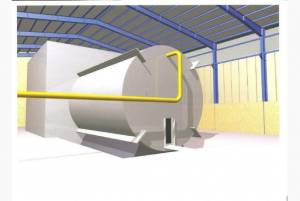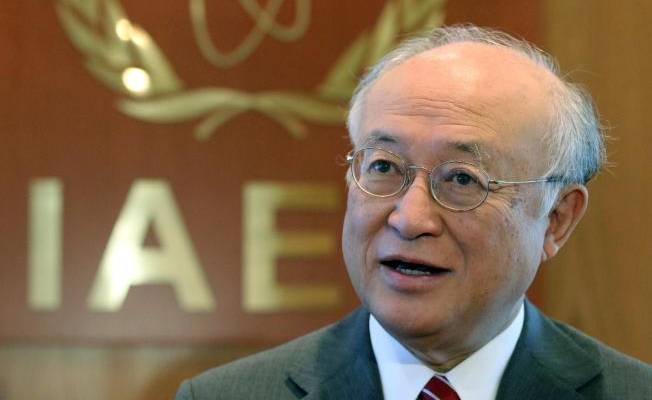
PM Netanyahu addresses US Congress in March, warning against nuclear deal with Iran. (AP/Susan Walsh)
“The IAEA investigation proves beyond any doubt that Iran’s secret program for the development of nuclear weapons continued even after 2003, as Israel has maintained,” a statement from the Israeli Prime Minister’s Office read.
Iran did work related to developing nuclear arms in the past, the UN atomic agency concluded in a report Wednesday that wraps up a near decade of investigations.
Iran has consistently denied any interest in nuclear arms or past work on such weapons, and Iranian Deputy Foreign Minister Abbas Araqhchi told Iranian television that the International Atomic Energy Agency (IAEA) report “confirms the peaceful nature” Iran’s nuclear program.
But the report contested that view, saying the agency “assesses that a range of activities relevant to the development of a nuclear explosive device were conducted in Iran prior to the end of 2003 as a coordinated effort, and some activities took place” up to 2009.
At the same time, the report said any such work was restricted to “feasibility and scientific studies” that stopped short of the advanced development of such weapons.
No previous IAEA report has so clearly linked Iran’s past nuclear work to weapons development.
“The IAEA investigation proves beyond any doubt that Iran’s secret program for the development of nuclear weapons continued even after 2003, as Israel has maintained,” a spokesman for Prime Minister Benjamin Netanyahu stated Wednesday evening.
Israel Demands More Detailed Investigation
“In addition, the report exposes the methods Iran used to conceal and deceive regarding its nuclear program,” the statement continued. “The most glaring example of this pertains to the Parchin facility, where the Iranians tried to hide and tamper with evidence of their illicit activities.
“Israel expects the international community to continue and expand the IAEA investigation in these areas and to use all means at its disposal to ensure that Iran will not be able to secretly build a nuclear weapon. Unless and until the investigation is completed, the world will not know the full extent of Iran’s covert nuclear weapons program and where it stands today.”
The IAEA described its finding as an assessment and left a final ruling on whether the case should be closed in the hands of Washington and other leading nations represented on the IAEA’s 35-nation board. That decision is tentatively set for Dec. 15, when the board meets to decide whether to endorse the nuclear deal signed in July between Iran and the US-led P5+1 powers.
The report noted:
—the existence of an “organizational structure” prior to 2003 “suitable for the coordination of a range of activities relevant to the development of a nuclear explosive device.”

An undated blueprint from inside the Parchin military site. (AP)
—development of detonators “relevant to a nuclear explosive device” while acknowledging that the devices also have “growing” civilian and conventional military uses.
—work on a separate explosives initiator that has “characteristics relevant to a nuclear explosive device, as well as to a small number of alternative applications.”
— environmental samples from a site that contravene Iranian assertions that the site was used for non-nuclear purposes. The agency strongly suspects Iran allegedly conducted tests of explosives meant to set off a nuclear charge at the location.
—no evidence of such work during a brief on-site inspection but determining that extensive construction work at the site previous to the inspections interfered with IAEA attempts to follow up on its suspicions.
The assessment noted Iran did not provide new information on some queries dating back to 2011 — when the IAEA first detailed its allegations — on work that in some cases seemed to have no other purpose but to make nuclear arms. In the case of “dual use” technologies that could be applied both for civilian and nuclear weapons programs, Iran said the experiments were civilian in nature or meant for conventional military purposes, the agency said.
In Washington, State Department spokesman Mark Toner described the report as “consistent with what the United States has long assessed — Iran had a nuclear weapons program that was halted in 2003.”
He also noted that the report fulfilled the conditions laid down in the July 14 nuclear deal. That agreement said that Iran must meet specific deadlines in cooperating with the IAEA in order for it to be able to wrap up its investigations by this month.
US Priorities Shifted
The US has long urged that Iran not only trim its present nuclear program but also admit to what it says was past nuclear weapons work. Iran’s refusal to address those demands led since 2006 to a series of UN Security Council resolutions and sanctions against Tehran — and until recently, the latent threat of US military strikes against Iran’s nuclear facilities.
Those threats diminished — and Washington’s priorities shifted — with the signing of the July 14 nuclear deal. The agreement commits Iran to cutting back for more than a decade on nuclear technologies that could be used for weapons-making in exchange for sanctions relief.
The long-standing US mantra accused Iran of “deception and deceit,” on the weapons issue. As late as mid-June, Secretary of State John Kerry said the IAEA report must “resolve our questions about it with specificity” before any nuclear-related sanctions on Iran are lifted.
Just weeks later, however, Kerry said Washington is not “fixated on Iran specifically accounting for what they did at one point in time or another.” Instead, he said the US is concerned about “going forward.”
By: United with Israel and AP
Do You Love Israel? Make a Donation to Show Your Support!
Donate to vital charities that protect Israelis and help inspire millions around the world to support Israel too!
Now more than ever, Israel needs your help to fight and win the war -- and also the battle of public opinion.
Anti-Israel bias and boycotts are out of control. Israel's enemies effectively use social media to incite brutal terror against innocent Israeli civilians. Please help us fight back!




